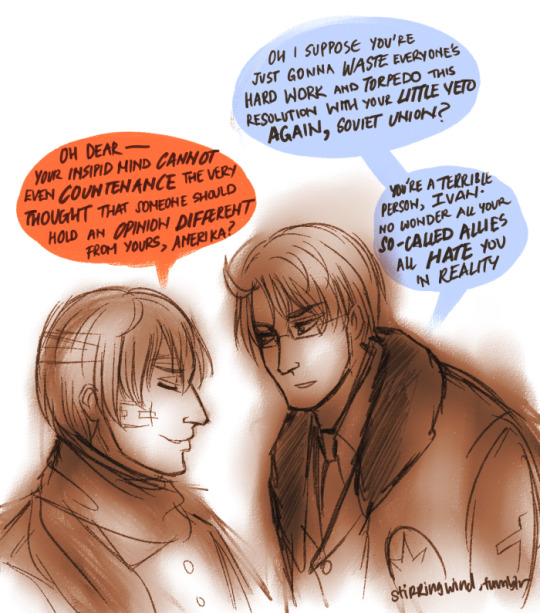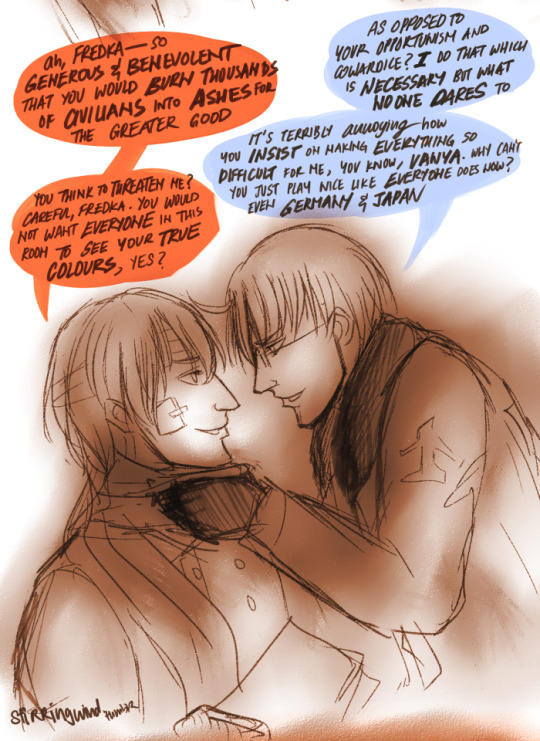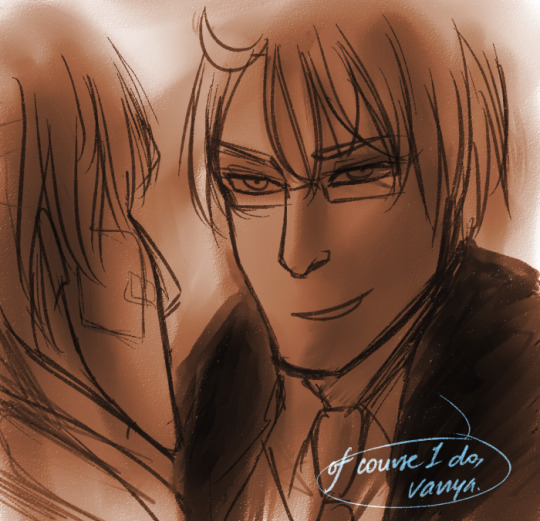Note
Do you have hc about how nations born?
On a large part, I share the headcanon of accounts such as stirringwinds, that the hetalia nations are dirt children - like the golums of Israeli mythology. Except that they are not brute muscle.
Though I also have my own stuff to add on to that: nations can cease to exist for centuries at a time or become incorporated into larger nations. As such I see four cases as being possible:
There is such a persistent "national idea" that the personification continues to exist.
The personification exists in form of a "shadow". (I kind of have this idea centring around hearts - you have to have a heart to be considered a full-fledged nation. A personification can exist without a heart but then they are beholden to the other personification that removed their heart).
If the cultural identity of two or more nations because too similar, then the personifications "'fuse" to become a new entity. Or the dominant personification "absorbs" the others.
Or simply, that some personifications can temporarily cease to exist. As in - the dissolve and then one day simply turn up in some office or meeting room with them having abridging knowledge of the time while they were "away" due to the memories of their people.
20 notes
·
View notes
Note
your writing is gorgeous. your views on countries and how you interpret them is what I also view too and I am so glad someone is putting it in such elegant way. i aspire to create art and work like you do thank you for giving me the fuel to create more pieces about these silly countries
Always the pleasure and thank you for the kind words. We all love these low-budget anime men☺️
1 note
·
View note
Text
Hey folks! It has been a while (again) so I thought I would show a sign of life just to signal that this account ain’t dormant or abandoned. A few things have been preventing me from posting and writing:
Exams. Yeah, almost three months ago, but yeah. (I somehow managed to ace Organic Chemistry. Just how?)
Drivers licence. After postponing it for half an eternity, I decided to do it. Not like I want to buy or even drive a car anyway. I mean, I can get anywhere I want by train or bus; never have paid more than 250€ annually for transportation either. Yet considering everything, it’s better now than never. Petrol prices are going to skyrocket this winter.
Family and friends. Surprisingly (to me included) I have a rather active social life. Dunno how I got there; seems some people like sarcasm and dark humour.
Work. Or to be more precise, the job I’ll be taking on in September. They sent me some links for online courses for the lab systems and a few text books in pdf format.
Updates will follow. Not making any promises when they will happen because I’ve finally accepted that I have Adam Douglas’ attitude towards deadlines (at least those that are not dictated by strangers). Oh, and I have corona.
5 notes
·
View notes
Photo
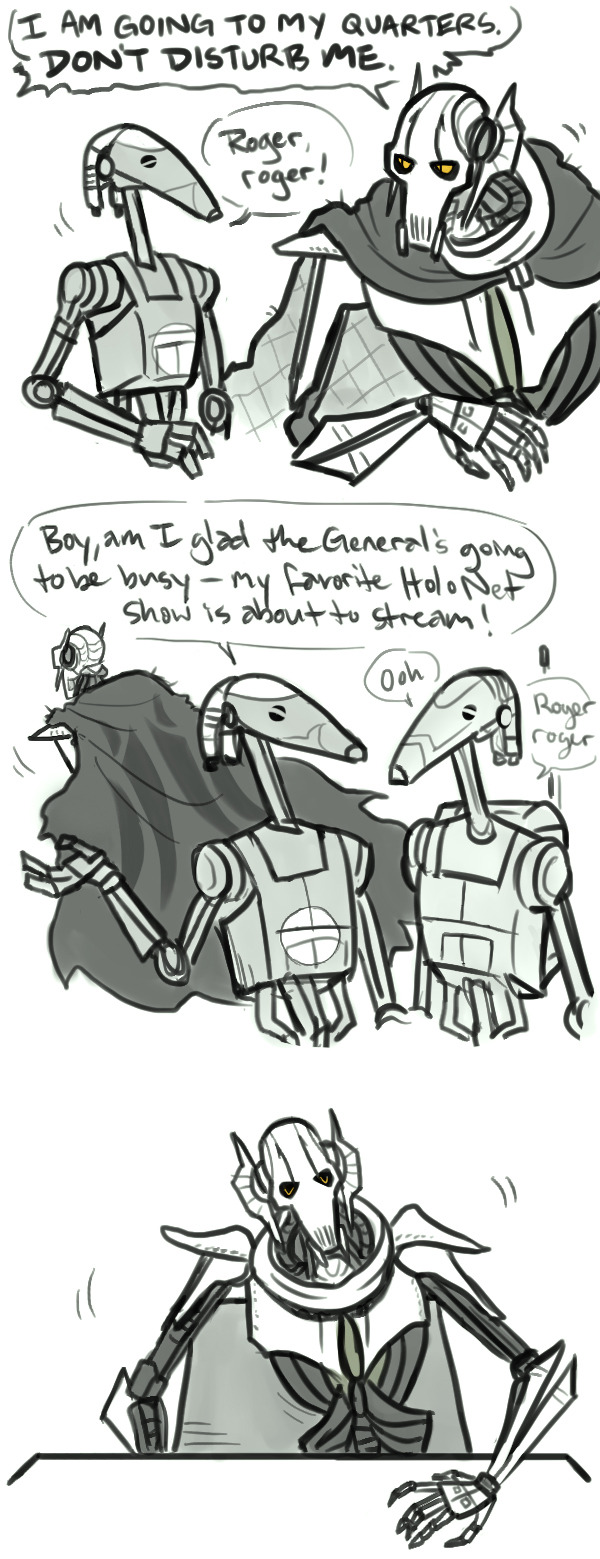
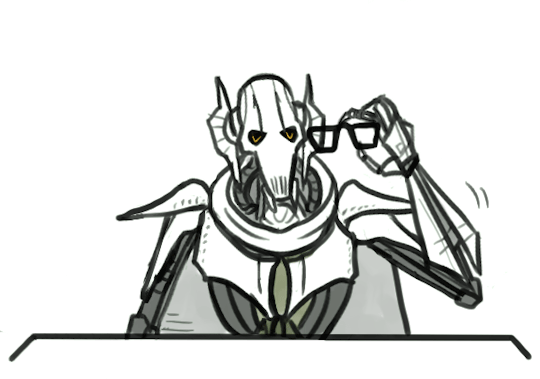
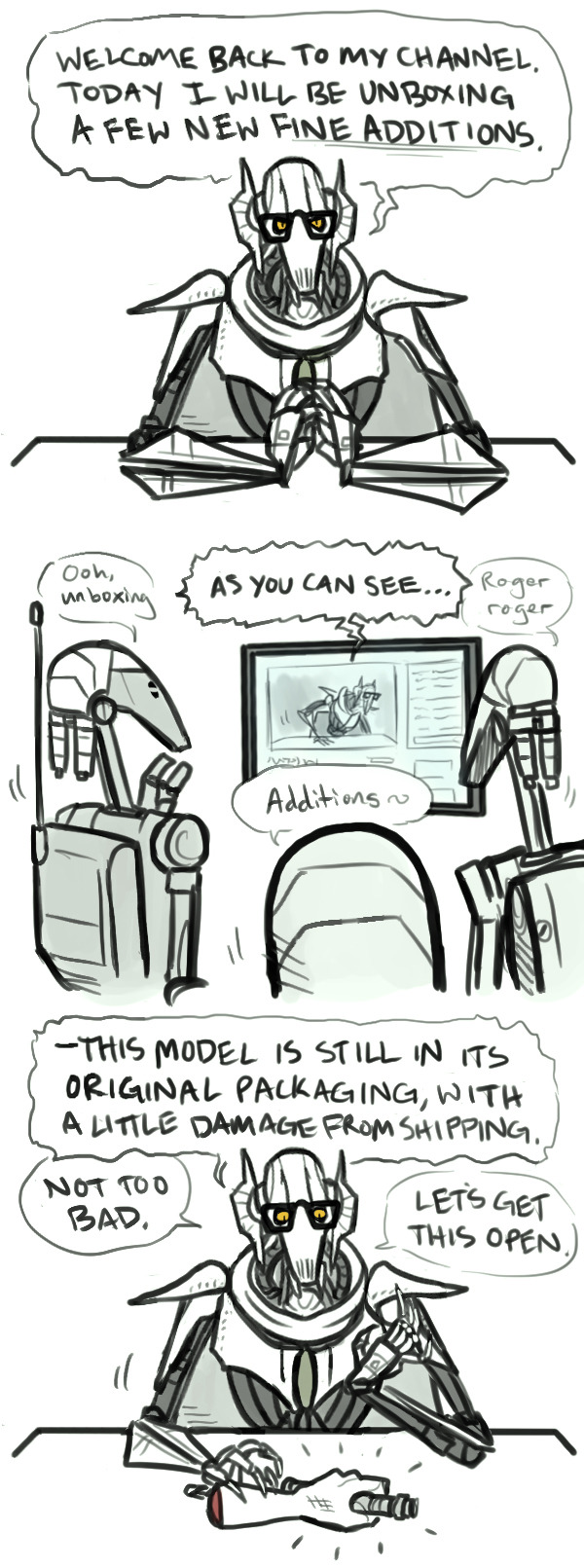

A dumb comic about Grievous’ collection~
62K notes
·
View notes
Text
A Nurturing Environment?
I frequently find myself at a loss when I discover the mindset that the Jedi Council, the Jedi Order, and even Obi-Wan provided a particularly good environment for Anakin to learn/grow up in. By comparing Anakin in TPM to AoTC, I believe it will become quite clear by the change in Anakin that the Temple provided an inadequate place for him to grow.
In TPM Anakin is a very self-confident boy. He is aware of his capabilities and limitations, expresses his opinion firmly, and, as a rule, doesn’t allow his detractors to get him down, or put him down. To list some examples:
He has the courage to initiate a conversation with Padme
In the novelisation, he even says that he’s going to marry her.
He stands up to Sebulba and confidently imitates a conversation with Qui-Gon
He invites perfect strangers to his home.
He calls Qui-Gon out on being a Jedi
He calls Qui-Gon out on slavery
He insists that he can win a podrace, and defends himself when his abilities are questioned
He ignores the ridicule of the children in his community
He talks back to the Council, not rudely, but forcefully.
He asks Ric Olie about piloting and is told he “catches on quick.”
He says he’s going to “see them all,” when he asks about star systems
He refuses to let people destroy his dreams-hard to do when you’re a slave.
He even talks back to and defends himself to Watto-his owner.
Clearly, Anakin is a very confident, and self-possessed individual. He states his opinions firmly, and defends them with conviction. Let’s compare that to AoTC Anakin:
Is far more nervous around Padme (which can admittedly be chalked up to hormones.)
Is shot down hard by Obi-Wan when he expresses his opinions-He does not ever really try and defend himself
Obi-Wan actually seems surprised he stands up as much as he does-clearly it is a rare occurrence that Anakin states his mind like that.
Anakin looks scared of what he’s done when he backs down
He looks timid in front of the Council-Far more so than in TPM
He is told “don’t do anything without first discussing it with either” Obi-Wan or the Council.
He just accepts Padme’s harsh criticism when he points out that she should discuss security concerns with him: Despite the fact that she is in the wrong, he does nothing to defend himself.
He expresses the opinions of Obi-Wan, Yoda, and mace, far more than he does his own. He actually seems afraid to give his opinions, as a rule.
There is a vast difference then between TPM!Anakin and AoTC!Anakin. The former defended his beliefs vehemently. The latter is afraid to even express them. Anakin only rants about Obi-Wan when Padme gives a hint of listening; it’s clear this has been pent-up in him for ages, but he hasn’t been able to let it out. Clearly, no one cares what he thinks or feels. When Padme shoots him down over security, he takes it meekly, but when she expressed doubt with him in TPM over his ability to win the Boonta, he just brushed it off, and told her “he’d win this time.” Before, in TPM, he said what he thought, now he just says “Master so-and-so thinks…” He feels uncomfortable saying what he really thinks. He honestly was more comfortable speaking up as a slave, than as a Jedi. Even just the body language difference can tell you that he’s gone from sure of himself to intensely insecure.
This is Anakin in TPM sticking up to his owner:
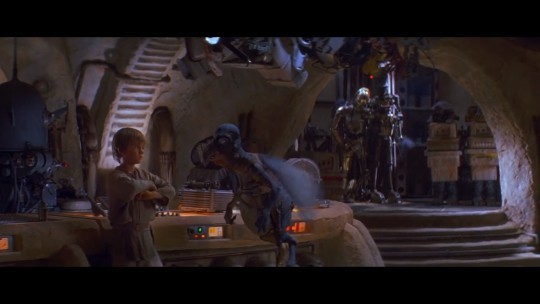
This is Anakin in AoTC, free, ostensibly, with his teacher:
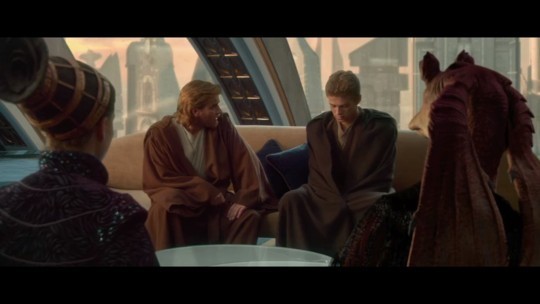
It’s like chalk and cheese. One boy is sure of himself, the other looks brow-beaten. What could have caused such a massive shift in self-esteem? Well, a classic cause would be bullying. A child who is different, for whatever reason, gets humiliated, ostracized, beat-up, talked down to, and loses their self-confidence. I don’t doubt the same thing happened to Anakin. He was from the Outer Rim. He began his training late. He was different, unnaturally gifted. I’ve no doubt that was rough, and clearly he wasn’t given any kind of support to help with that, rather he was given the opposite. Hence, he is insecure.
This is in no way his fault. He’s barely an adult by AoTC, and it is up to the adults responsible for him during his childhood to provide a safe environment, if not a safe haven, for him to grow up in. Clearly, the Jedi have failed to do this. Indeed, as shown when Obi-Wan says “don’t do anything without consulting either myself or the Council,” they clearly had no faith in him whatsoever, (after ten years), so why should he believe in himself? In RoTS, Windu actually says when Anakin tells him about Palpatine, “If what you say is true, you will have earned my trust.” In thirteen years, Anakin who has worked diligently, and loyally as a Jedi, and he’s never earned Windu’s trust or respect! That is cold. What was Anakin suppose to do anyway as a boy? Go back to Tatooine? Anakin really didn’t have much choice but to stay. At least, with the Jedi he would get a good education, and would learn how to use the Force. There was nothing for him on Tatooine. What good would he do? By staying with the Jedi, at least until he was knighted, he might be able to help when he finally goes back to Tatooine. He’ll have the Force, and an education that would serve him well. (Then, of course, the war started so that went out the air-lock…) No, the fault for Anakin’s low self-esteem lies entirely with the Jedi Order, Obi-Wan, and the Jedi Council. You cannot blame Anakin, especially since he was a child at the time. Frankly, the Council should be ashamed of themselves. If you adopt a child, and he wilts that much under your care, you need to take a good hard look at yourselves.
2K notes
·
View notes
Quote
This is how it feels to be Anakin Skywalker, forever:
The first dawn of light in your universe brings pain.
The light burns you. It will always burn you. Part of you will always lie upon black glass sand beside a lake of fire while flames chew upon your flesh.
You can hear yourself breathing. It comes hard, and harsh, and it scrapes nerves already raw, but you cannot stop it. You can never stop it. You cannot even slow it down.
You don’t even have lungs anymore.
…
You open your scorched-pale eyes; optical sensors integrate light and shadow into a hideous simulacrum of the world around you.
Or perhaps the simulacrum is perfect, and it is the world that it hideous.
…
You remember the dragon that brought Vader forth from your heart to slay. You remember the cold venom in Vader’s blood. You remember the furnace of Vader’s fury, and the black hatred of seizing her throat to silence her lying mouth -
And there is one blazing moment in which you finally understand that there was no dragon. That there was no Vader. That there was only you. Only Anakin Skywalker.
…
You killed her.
You killed her because, finally, when you could have saved her, when you could have gone away with her, when you could have been thinking about her, you were thinking about yourself…
It is in this blazing moment that you finally understand the trap of the dark side, the final cruelty of the Sith -
Because now your self is all you will ever have.
…
In the end, the shadow is all you have left.
Because the shadow understands you, the shadow forgives you, the shadow gathers you unto itself -
And within your furnace heart, you burn in your own flame.
This is how it feels to be Anakin Skywalker.
Forever…
- Revenge of the Sith, Matthew Stover (via imperialarchon)
#this description from the rots novel always gets to mr#really show cases what anakin has lost#the contrast between Anakin Skywalker and Darth Vader
2K notes
·
View notes
Text
Video description: an AO3 tutorial, narrated by a female voice and posted on tiktok.
The screen shows an AO3 news post titled Hidden search operators cheatsheet.
"Do you ever forget the title and author of a fic, but you remember the summary?"
The video scrolls down the page and highlights one bullet point on the cheatsheet.
summary: string for works with a particular word or phrase (in quotation marks) in the summary
"You can actually search for that."
The screen changes to show a closeup of the Search box embedded in the coloured bar at the top of the AO3 homepage. Inside the box are the words summary: love
"So you can search here using a keyword. Pro-tip, the word "love" is going to get you a million results."
The search changes to summary: conferences
"But the other day, I posted a fic with the word conferences in the summary, and I think that's probably pretty rare, so let's see."
The user presses the search button and the results page populates. The user zooms in to show 322 Found.
"Okay, 322 found. Out of 7 million, that's not bad!"
The screen returns to the search box. This time the text inside the box reads summary: "conferences kind of suck"
"But I used the phrase conferences kind of suck, so if I search for that and put that phrase in quotation marks-"
The user presses the search button again and the results page populates. This time there is one 1 story found.
"Look! It's the only result."
The screen changes to show the page containing all 32177 Works in the Agents of S.H.I.E.L.D. fandom.
"And the thing is, if I know the fandom that it's in, or the ship, or anything else, I can filter-"
The user taps on the Filter button to open up the sidebar. The screen changes to a zoomed in view of the lower portion of the sidebar with the Search Within Results box at the centre of the screen. An emoji of a hand points to it. Inside the box is the text summary: conferences
"And I can use that same search operator in the Search Within Results box" Note: This is instead of doing it in the search box at the top of the page.
The user presses the Sort & Filter button and the results page populates showing 2 works found within the fandom.
"And look! There's only two works found, and they're both in the fandom, and one of them is my fic."
4K notes
·
View notes
Note
😤America!
😤what’s something that will always, without fail, make them angry?
Try to take away his machine guns and give him healthcare and make him live in a sane society?
Okay--- serious answer now. This was a lot longer and more political but RIP this is fandom. So moving on!!
Uncomfortable truth. While I think he is very intelligent and idealistic, Alfred believes his own bullshit. He's used the nature of his human body to reform his memory to match his national mythology. Alfred honestly believes he's the greatest country on earth, that he's a self made marvel and that god smiles on him. He can frame events, his choices with hindsight to fit this. When one of the few people who can correct his memories, Matt or Arthur or a historian, brings up things that dont fit his narrative, it pisses him off, disturbs him, upsets his balance.
48 notes
·
View notes
Text
On Nations and Love
This topic had to be addressed rather sooner than later, because what can be more human than to love? Hetalia is also a fandom of ships (really guys, I don’t think any other fandom has such intense shipping wars) so I’m here to throw in my two cents to this conversation, whether it is wanted or not.
As personifications that represent humans, I do see them wanting to be loved and love. The yearning for deep social connections is one of the most human things there is. Humans can’t survive being isolated and there is more than enough history to prove that.
Many in the fandom portray them as being capable of loving each other, of finding understanding and compassion in one of their peer. Many also depict them as being able to fall in love with humans and, considering the differing life spans, such relationships always ending up being tragic.
I see the whole thing a tiny bit different. As a principle, they can fall in love with each other. Each country has bouts where they are fascinated with another of their kind, indulging in the other’s culture and doing their best to foster a strong alliance. Yet such relationships tend to be very one-sided, with usually only one being imitated and lauded. Besides, this usually is solely infatuation, since none of them would sacrifice themselves for the other.
Their feeling for each other wax and wane in tandem to political shifts and their people’s preferences. Besides, they each abide to a different set of cultural values, so much so that their actions can sometimes be incomprehensible to their current partners. There are very few cases where they actually and fully understand each other. Some don’t even bother to try to understand the other.
And even if the partnership seems stable, there is always the underlying tone of danger, of something being threatening because it is foreign and different. Relationships don’t last and can easily turn into subjugation is they are not careful enough. As such, they can never really love another nation, at least not in how we understand the word love.
As for humans – there is the whole issue of them being mayflies. They are worlds apart no matter how close they are. Humans can’t ever really hope to comprehend the eldritch of what it means to be a nation. Nations can’t really share their problems that come with being a personification without automatically creating an unbridgeable gap between them and the human in question. In effect, as soon as they would reveal their true identity, the dynamics in the relationship would shift severely, probably going as far to permanently damage it.
They’d be viewed as mentors, authority figures or parental figures as best, as alien and monstrous at worst. Friendships between nations and humans would also be strained or at least altered this way, but never to the extent that romantic relationships would be fully functional. Maybe there would be the one or the other human that would be able and willing to look past the whole “national avatar” schick and see the individual and expect the individual, yet those humans would be few and far between.
Concluding – semi-immortal people made of mud and blood and ideas want to love and be loved. They just can’t get it because of politics and their fundamental paradoxical natures. (Don’t look at me, I’m here for the angst.)
37 notes
·
View notes
Text
Nations and Public Personas
As a general rule of thumb, humans develop a persona, or in simpler terms, a public mask. This is a sort of outward display of one’s personality, with the personality traits curbed, exaggerated or hidden in order to fit societies expectations and overall how that person wants to be viewed.
So why wouldn’t nations have that as well? Why wouldn’t they have multiple personas, now that we’re talking about. Politics tend to be messy, with each participant doing their utmost best to display a selected set of character traits in order to succeed. And since politics would play a very large role in inter-personification interactions, the use of a specially crafted persona would be very important.
Each nation would aspire to be seen as the wellspring of civilization, as the bastion of culture and the seat of power. They wouldn’t want to be seen as anything less than their uttermost best. Which would be why Austria would choose the role of a prissy Viennese aristocrat, even though he is also the hardy Tyrolean highlander as well as the blunt Carinthia farmer. Which is why England would prefer to be seen as a caustic London politician rather than as a foul-mouthed coal miner from Yorkshire even though, as England, he is both.
Some, on the other hand, would purposefully craft flaws in their public masks to make other nations and their rulers underestimate them – like America, with his Obfuscating Stupidity or Russia, with his Obfuscating Insanity. It also could be a survival trick, playing old and feeble in order to appease occupants as would be with China, or as a way to slowly assert soft power, as in the case of Italy. Or it could be used in order to not seem so dangerous to despots, as would be with Romania.
On the other side, there would be the whole issue with keeping The Masquerade up and having to act like a normal citizen and not some century old eldritch being with the according memories and knowledge, having met every national hero all while having the body of a Greek deity. No matter where they are in their country, they would have this uncanny ability to go local and melt into the crowd. Yet they would still radiate something that would make humans intrinsically know that they are not completely human.
#hetalia#hetalia meta#hetalia headcanons#historical hetalia#aph america#aph england#APH Austria#APH Russia
170 notes
·
View notes
Text
1776 – New England
Rain patters on the tent over his head, yet Arthur is too entrenched in thought to waste much thought on the downpour. Sure, the weather has been bloody rotten for the past few weeks, with late summer turning into cold autumn. And with the chilly northern winds came rain that soaked the common foot soldier to the bone.
A couple had already died from the flu, the numbers were jolted down somewhere on a fried slip of paper. Yet England couldn’t bring himself to care at present, there were much more important matters to sort out.
Like his wayward brat of a firstborn.
His little Alfred has now deluded himself into thinking that he has become an adult, when such a thing couldn’t be further from the truth. Of course, being a personification, that came intertwined with inked words and promises of revolution and entitled statesmen grafting their dreams onto reality.
Though, in retrospect, it had much deep roots than even that. The American colonies had been founded and nurtured in their infancy of religious dissidents, by all those Quakers and Baptists and Puritans that had safely exaggerated their fundamentalism far away from the beautiful British Isles. Naturally, Arthur always did what he could when it came to his eldest. He liked to think of himself as a benevolent father, with enough firmness to ensure that the young brat didn’t spiral out of control.
After all, what had he had, as a fledging nation, other than insecurity and blood and filth. Post-Roman Europe had been a slugfest, with nations flickering in and out of existence like dim candles. On a part, he had only survived that through sheer ingenuity and a generous dollop of luck. The British Empire had been born drenched in blood, swathed in iron chainmail and filth with bespoken words of hegemony a guiding light to a brighter and better future. The promise of being the heir of Imperium Romanum.
He curls his fingers in the leathery fabric of his breeches, his other hand viciously carding through his hair. It is blond and choppy, short from the last time he shaved himself bald dur to lice, and slightly greasy from being under that white powdered wig the whole day.
Never had he thought that somebody could anger him to a greater extend than his wayward brothers. France evokes disgust mixed with dashes of anger and harsh undertones of hatred. Spain once made bitter, caustic envy bubble to the surface, still does in a way, though not to the extent it did before the defeat of the Spanish Armada and the harvest of all those Spanish ships.
He had coddled this brat, given him a name and a place in the world, extended his protection to him. In this dog-eats-dog world, the protection of an elder was an utter luxury, especially amongst their kind. Children were to pay piety to their parents, colonies to their wardens doubly so. And yet, the uncouth little brat has the audacity to bite the hand that feeds.
A bitter smile rises to a set of thin dry lips as recollections rose to the surface. It was a given that Alfred wasn’t the easiest child to raise. In the first decades of his life, he had been a distrustful little tyke, that only being amplified by the sneers of “bastard” that adults thought he couldn’t hear and that one incident with that backstabbing whore of a governess back in the Hartford during the 1650s. He had also been a sweet child, so eager to please and live up to his father’s sky-high expectations.
Adding to that, is that there always was an ocean between them, both in the literal and the metaphorical scene of the word. Crossing the Atlantic was tedious and time consuming, England’s visits therefore being few and far between, things had slipped through the cracks, like missing literature and slight signs of dissent that hadn’t been quelled by a good hiding.
It is France’s fault, as it usually tends to be. Unable to accept defeat, the debauched country had reached out to the colony and nurtured the seeds of dissatisfaction that had already been there. Through extensive letters, the European had pointed out the injustice of the colony having to fill the coffers that had been emptied in course of the war, had discussed the woes of no visual representation and of mercantilism and…
The Empire stops his pacing and sighs. Soon, he’ll show his Alfred just how much he still has to learn. He’ll demonstrate the boy what it means to be proficient in the art of war and tug him back in the welcoming embrace of the British Empire. There would be lessons to be learned, and after this fiasco England won’t be so lenient anymore. He had coddled the boy too much, allowing him far too many freedoms. After this, he would have to be sterner in order to remind the colony who he belongs to.
First he had a war to win, and his Iroquois and his Cherokee allies. He had promised them to curtail his son’s habit of encroaching on their territories as well as autonomy. Deep down, Arthur doubted his son could win against his father and the peoples who inhabited the land before the mere idea of his was conceived, and thus knew this continent better than him.
#historical hetalia#hetalia#aph england#aph america#hws england#hws america#unhealthy father-son relationship#dysfunctional relationship#american revolution#let's just say that I don't see the relationship between england and america as being rosy#toxic relations and power plays - the mark of empire
55 notes
·
View notes
Text
Cordiality – Japan
"There are three things all wise men fear: the sea in storm, a night with no moon, and the anger of a gentle man."
— Kvothe, The Name of the Wind
Japan is polite. It is what sets civilization apart from the barbarians after all.
That was at least what he had always been taught by China, back then when the latter had been so mighty that it had been easy to believe that it was by heavens mandate that he had been so mighty. Back then, he had adopted the Middle Kingdom’s teachings willingly because he had believed that they were the apex of human achievement, something so close to perfection that it had to be imitated.
He had believed that, and in his faith he had paid tribute to the Divine Son of the Heavens. That was when he first learned cordiality and all the arts of language, the art of manner and diplomacy. For if humans wanted to be closer to the gods, shouldn’t they strive to be just as patient and masterful as them?
Through the centuries, through the millennia even he had learned to weigh everyone of his words against gold before uttering them. Saying words was like weaving a tapestry after all – each word a different colour, each tone adding nuance, words and sentences conjoining to result into something marvellous or horrendous. They could destroy everything one hoped to achieve or grant one the boons of the heavens. That was why he was always considerate with them, never addressing problems directly because it was rude, always making sure to keep his tone steady.
Thankfulness towards the kami was dedicated by Shintoism, and it was something that translated into all aspects of his culture. Kiku was precise and stoic and clean, anything less wouldn’t only be an offence to the spirits and his peers, but to himself as well.
Yet, many people forgot that there was always more to him than just that. People looked at him, with his perfectly pressed suit or carefully arranged kimono, listened to him apologise for such minor inconveniences that weren’t even worthy of anger. They experienced his attentiveness and dedication to their happiness when they were his guests and he played host and they regarded him as too friendly and harmless to start a war.
A tea ceremony is always performed with steady, resolute movements that are nevertheless imbued with elegance. It always follows a strict protocol – each step timed and practiced and ever so slightly adjusted to suit the circumstances. This time when he was performing the ceremony with this Westerner wasn’t any different.
Kiku inspected his guest, with his tall stature. The Netherlands wasn’t accustomed to kneeling, and was therefore sitting cross-legged opposite of his host. Japan kept his visage schooled into a blank expression and refrained from commenting on the social faux-pas. After all, a host had to be hospitable to his guest. And besides, openly voicing displeasure was rude, especially in formal circumstances.
He was well aware of what was brewing in Europe, of all those uncultured brats that considered him a suitable target from their expansionist interests. He had also been like that before he had opted for utter isolationism. They considered him too nice to lift a sword in defence, too polite to bat away the pressures to open his harbours to them for very long. Yet they forgot that he was older than them and had lasted so long for very good reasons.
Japan is polite, but that doesn’t mean he is a push-over.
Japan remembers a book that England had once brought him, one of many presents given to him over the course of their alliance in the late 19th century. “The Strange Case of Dr Jekyll and Mr Hyde” it had been called and he had taken two quiet evenings to read it through.
It described how man doesn’t exist in unity, but in duality. That there is a shadow to every person, a darkness that wants blood and glory and retribution. Many forgot that he had his own personal Mr Hyde, and unlike the protagonist of the book, he wasn’t separate for it.
They forgot that all his keenness made him a formidable opponent to face on the battlefield, his focus on his purpose and goals as unwavering as an arrow that had just left the bow string. They failed to remember his commitment to ceremony and protocol also applied to military campaigns and invasions and occupations. He wasn’t without self-interest or pride, and would be damned the day he lost both.
All to many overlooked the fact that his discipline and adherence to guidelines was as suited as it was in the position of general as it was in a laboratory. That is stoicism allowed him to go beyond and above the capabilities of an ordinary man.
Like one of those Austrian psychologist said – the more a person strives for perfection the darker their shadow. And his had stood in sharp, horrifying contrast to the politeness he was capable of.
China may have acted as a mentor, may have taught him the art of war and dozens upon dozens of stratagems and manoeuvres and truths. Yet he had forgotten that the student only really ceases to be such when he has gone beyond the teachings of the master. The great red dragon had slept for far too long, and the world had changed inexorably in the meantime.
And in this changed world, it was now Japan’s time to crave himself a place along with all those Western Empires. The sun would rise over Asia, and it would be red. Of course, China and then later America had been shocked by his ferocity – in Manchuria and in Malaya and in the Pacific Theatre. Such was his determination; such was his ambition. Of course, in a culture where honour went before life, the rules were set differently.
Japan was always polite and durable and collected.
Yet that had wavered upon defeat. It was the consequence of being drained of his people, with society being reformed when the old ways proved rotten and corrupt. His spirit had been broken upon the atomic anvil of yet another new age and mended to suit the coming world order.
Sometimes, he liked to imagine that America had mended him with black lacquer mixed with gold – kintsugi performed on the soul of the nation. It certainly fitted in the poetic way he sometimes liked to view the world, and it cemented his belief that he was better than he once had been. While the boy king had committed his own slew of atrocities, Japan certainly had received a better fate than he thought he would have, conquered empire and all.
All in all, he had made the most of Pax Americana, and thus had secured himself his own place next to the sun.
#historical hetalia#aph japan#Character Study#hetalia#hws japan#character analysis#period typical attitudes#tw: imperialism
28 notes
·
View notes
Text
Personifications and Revolutions
As a bit of a continuation of my last hetalia meta post, another idea has popped in my head. As discussed, politicians are weary of the personification, yet think of what that means in terms of revolutions or even just succession.
Revolutionaries rise with the intention of changing their respective countries from top to bottom. The personification would therefore represent the system they aim to overthrown, and in their eye, a new and glorious and pure personification would have to rise out of the diseased ashes of the old.
As in – despite having help overthrow the Romanovs and also disproved of the imperial policies, the Bolsheviks would have dispatched Ivan and waited for a new Socialist Russia to arise. Only to be disappointed when the bullet holes would have closed and Ivan Bragvinski would have nonetheless arisen, new but not completely new.
Or during the French Revolution, when instead of staying dead and rotting, Francis would have sown his head back on, and marched with the Republicans. They would all want a brand new avatar of the new system they would create, yet they would be stuck with the same old personification, because the personification represents The People and not only the government as they would love to have it.
This wouldn’t be restricted to revolutions – it is all too common that sovereigns that come to power through violent ways seek to undo everything their predecessors did. An eldritch being that could wear the same face throughout the centuries and upheavals and reforms would be the antithesis of the change they would envision to them. And this wouldn’t be limited to imperial systems, but would also frequently to democracies and dictator ships.
Political parties often have wildly opposing views and therefore would look down upon nations that they didn’t “mould”, wishing to have somebody completely new that could represent them in ways that they would fancy.
This would only reflect in how politicians would treat the national representatives – with the childish “you are not how I want you to be” notion. On part, with cruelty and condensation because they would still be the “same” nation that they despised and worked so hard to overthrow and reform.
92 notes
·
View notes
Text
Personifications and Politicians
During all my time in the Hetalia fandom, I’ve seen a lot of takes on how personifications interact with politicians and vis versa. Some depict them as having to obey the orders of their leaders, others as them having a bit more autonomy.
Yet, I see the whole relationship being very complicated…
I’m fully onboard with the headcanon that when politicians or even just celebrities hear that there are semi-immortal embodiments of nations, they usually imagine they’ll be meeting the popular depictions. As in, the gorgeous young maidens depicted in statues or the older men in vibrant colours on propaganda posters. The ensuing shock when fantasy doesn’t overlap with reality.
There also is another dimension to this whole situation – that there is a century, even millennia-old entity that has lived and partaken in revolutions, and wars and cultural shifts. And that they have opinions that don’t align with the current government – because they represent The People and the people are not just the government. Therefore, I see politicians being extremely weary of personifications.
Many would keep a close eye on them, because they reflect the opinions of the people that they are ruling. On top of that, they would be eldritch beings, that could really make a person’s life difficult and have a strong foundation for their various world views. These entities could kill mortals, politicians and had probably done so in countless wars and power-changes and revolts. So, what would prevent them from killing those in power if they would be dissatisfied with them?
Fear would rule many of the interactions sovereigns have with the personifications, so the former would counteract that with control. With claims that there power would be sanctioned by the Powers that Be. That the masses are powerless and stupid and that they don’t know what is good for them and therefore have to be ruled over; that therefore the nation must swear piety to their ruler. There are those that are served and those that must be served; the natural order, they would proclaim.
They would point outwards, towards foreign nations as the source of all possible woes. Or they would use unpopular minorities as scapegoats. In other words – they would distract from their mistakes and corruption by shifting the blame.
Those in power would probably also use other means of controlling nations, such as restricting the information that would come to them, threatening torture, or deportation, pouring salt in open wounds – present guilt, past mistakes, worries about the future – and threatening the welfare of the humans close to the nation at hand.
No doubt many rulers would do their best to keep their nations away from internal politics, as to prevent them from meddling or staging a revolt. Or they would let the country know, and make it clear that they, a semi-immortal being, would be powerless. This would be coupled with the myth of absolute power, because power is granted never taken, and if a political system can convince or coerce a personification into giving away their power, the less the high brass would have to worry.
The more authoritarian and totalitarian a government would be, the harsher these measures would be. The more democratic, the less.
219 notes
·
View notes
Text
My hot take on Historical Hetalia + Gay Ships
Yes, homophobia has been present in many countries and would have undoubtable affected the way personifications would have been treated with regards to who they would have romantic and sexual relationships with. During the Lavender Scare would have led to politicians’ side-eyeing Alfred, and the moral crack-down that occurred on homosexuality in Victorian Britain would have pulled a tight leash on Arthur.
The countries themselves would have undoubtedly thumbed their noses at same-sex relationships amongst humans if that was the attitude of the time. Yet they wouldn’t have done that in regard to their peers.
“Why would that be the case?” I hear you ask. Then let me explain.
These are century, even millennia old eldritch being. While they are human in many aspects they are also entirely inhuman in a whole host of other aspects. Many of them view themselves as separate from the humans they represent. Thus a “we’re not really human, are we? So why should the rules of puny humans apply to us” mentality would be very common.
Thus, along that vein, they wouldn’t have had any fears or dilemmas to harbour lust or love towards their peers of the same sex. Considering international relationships, the people in the know would have also allowed it.
However, the whole matter would have been approached with the Roman/Greek stance towards homosexuality. Meaning, the politicians and such would have endorsed it if their nation were the active partner. Passivity would have been regarded with shame – what glory and respect would there be for playing the feminine role in the relationship, the one of the slave?
The nations would have also bought into this, because power dynamics play a central role to them. It lies in their own self-interest to be powerful and to be regarded so.
Yet some of them would have had have held softer feelings towards each other and therefor kept the concerning relationship under the wraps. In such ways, cultural acceptance of homosexuality would be a boon, because it would mean that they can openly have relationships that are more than powerplays.
#historical hetalia#hetalia meta#tw: historical homophobia#discussions of homosexuality#eldritch beings
47 notes
·
View notes

